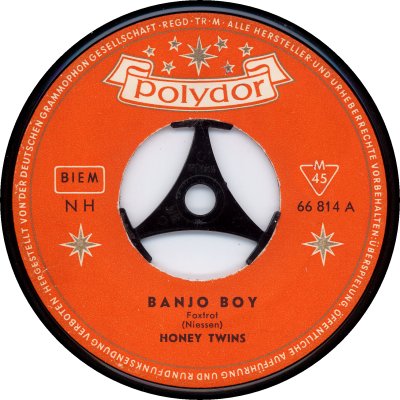
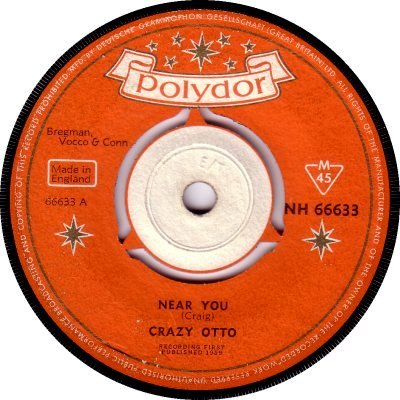

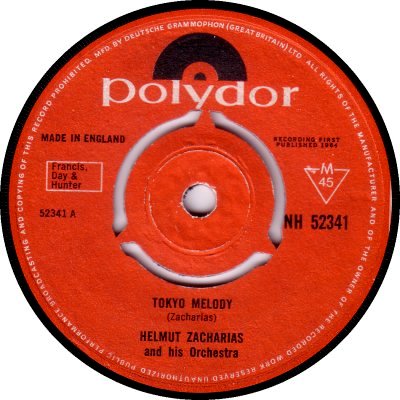
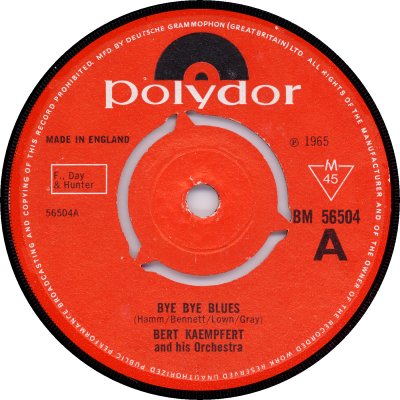

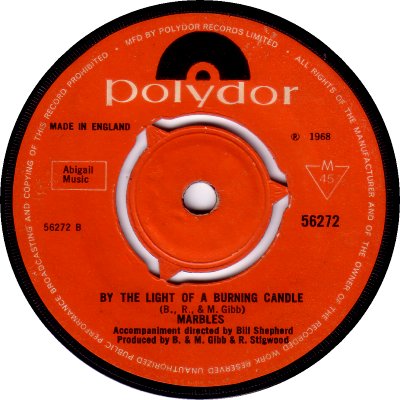
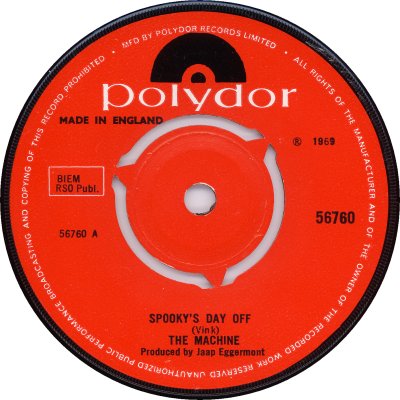

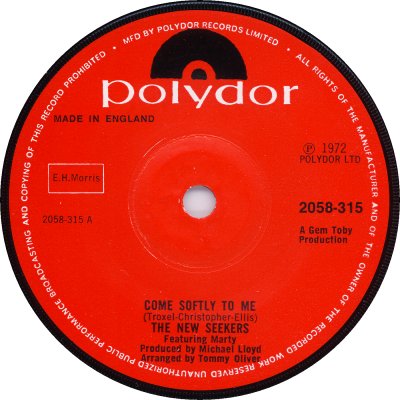
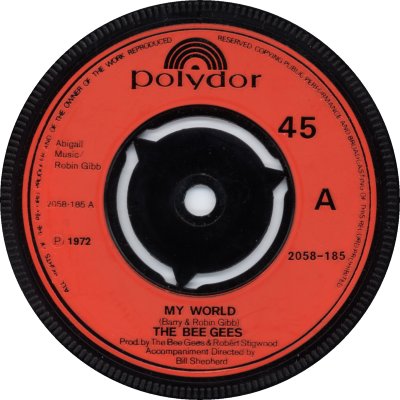
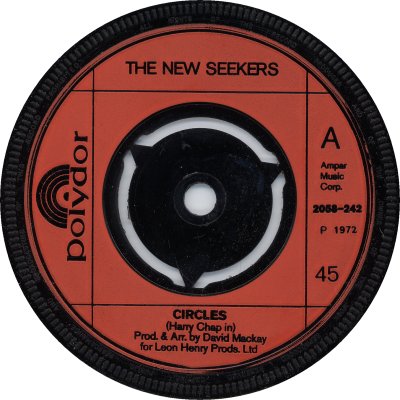
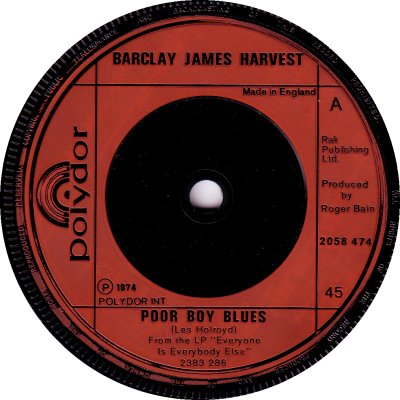
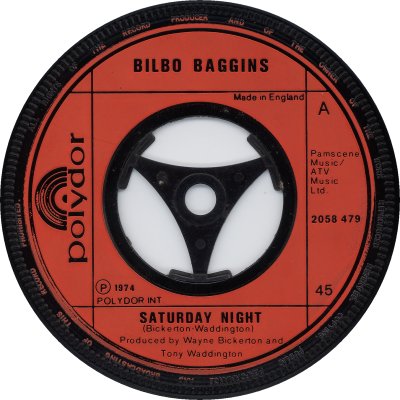
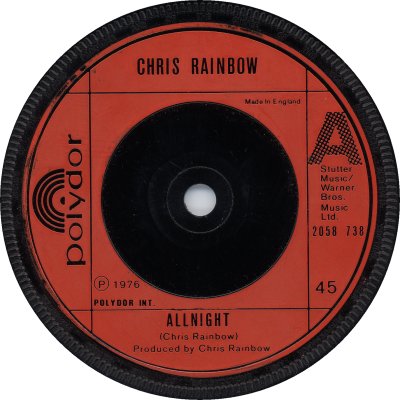
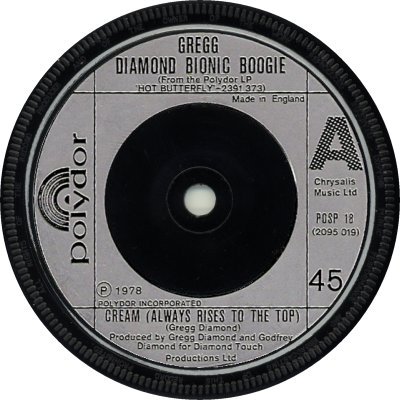
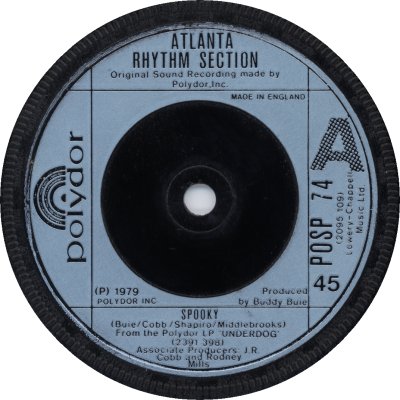
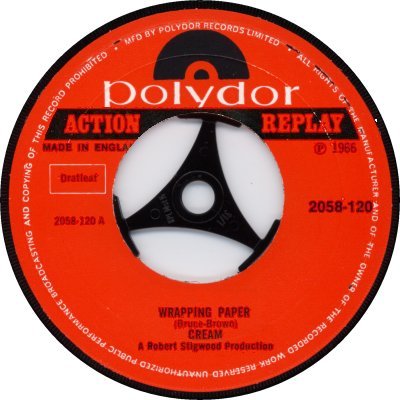
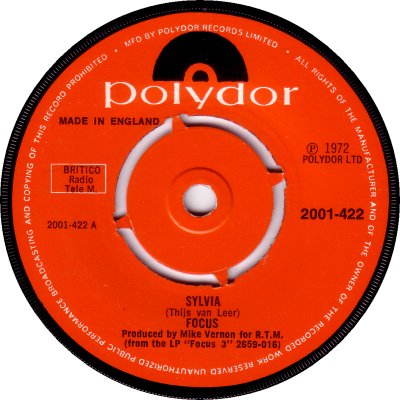
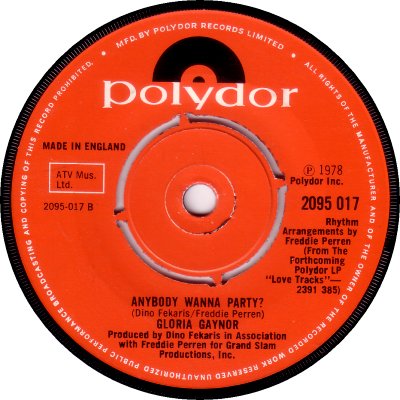
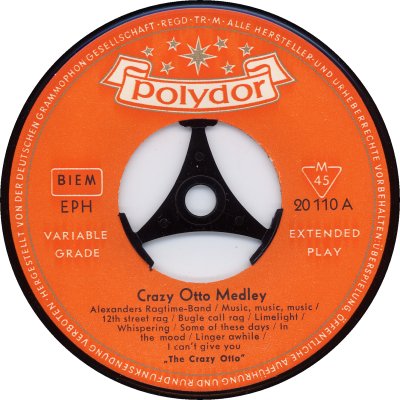
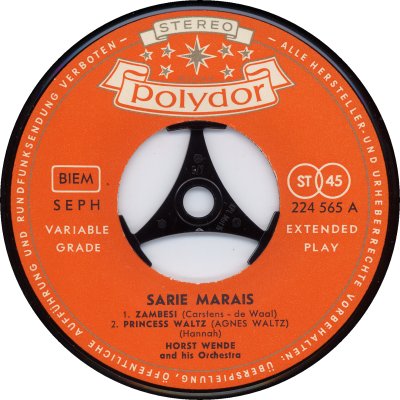
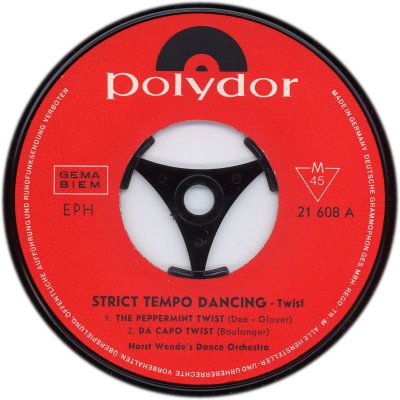
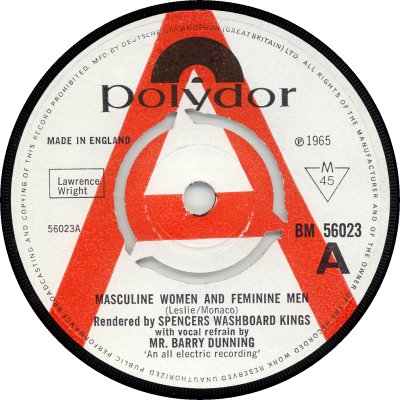
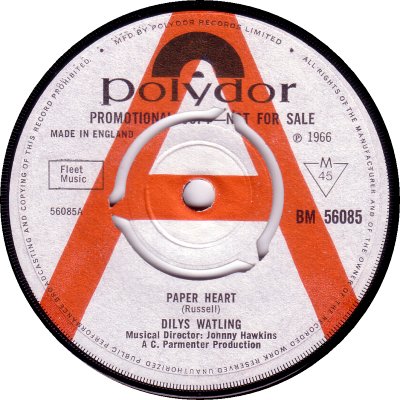
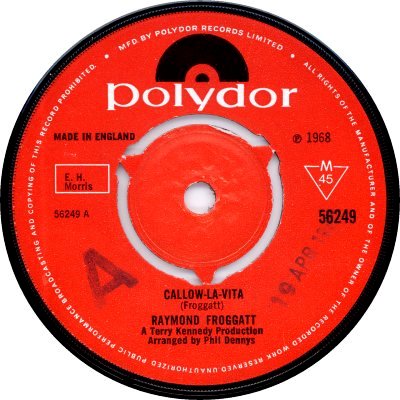
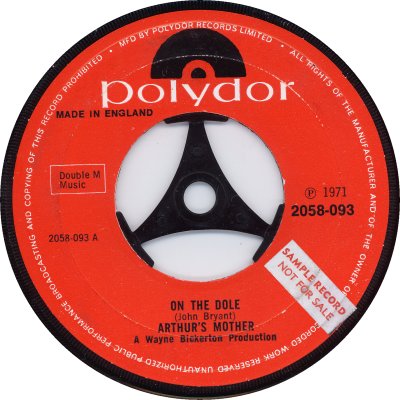
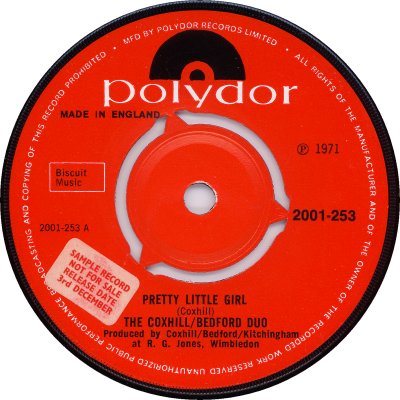

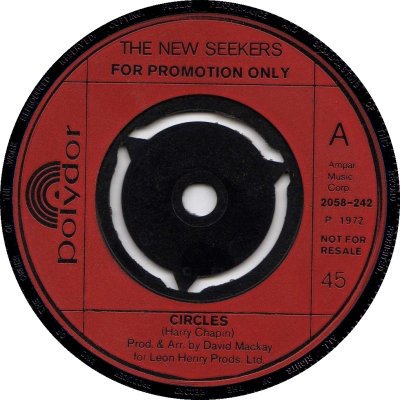
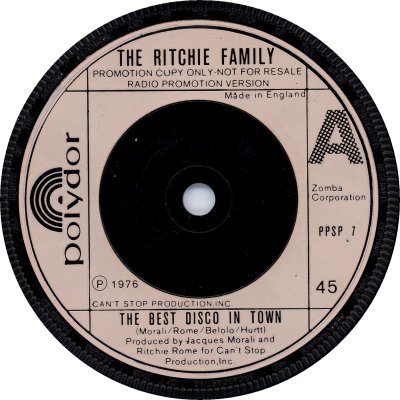
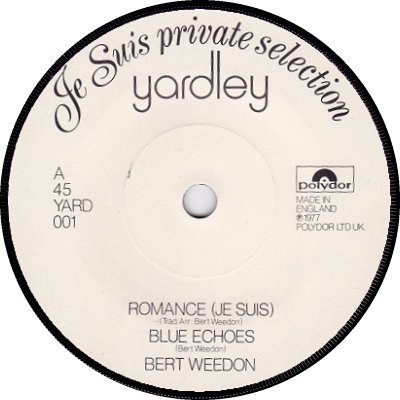

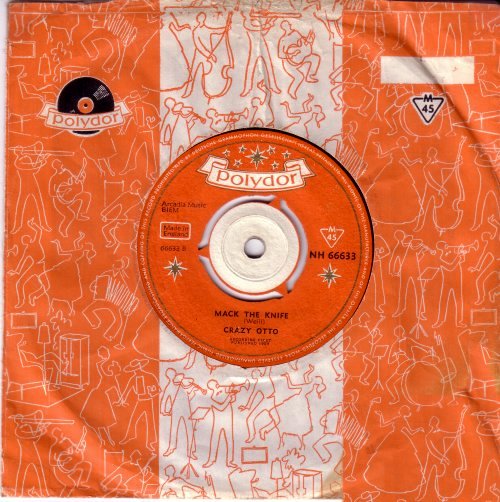
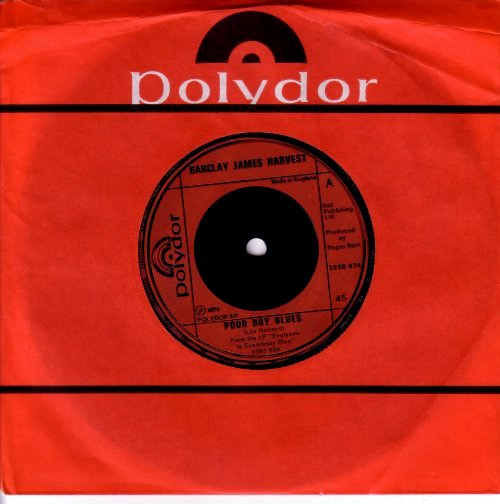
German in origin, Polydor was owned by electrical company Siemens and was a sister-label to Deutsche Grammophon Gesellschaft; it made its debut in Germany in 1924, as a label for exported records. From 1946 it became a Popular Music label, leaving DGG to concentrate upon Classical Music. It was launched in Britain in 1955, along with DGG; according to 'Billboard' of the 2nd of June 1956 Siemens established its 'Heliodor Record Company' here in 1954 to handle the two labels. Later in the decade, on the 1st of September 1958, the Heliodor Record Company underwent a change of name and became Deutsche Grammophon (Great Britain) Ltd. By the end of the '50 the company's two labels had become four, Heliodor being introduced as a cheaper outlet for Classics, while Archive Production handled material from Deutsche Grammophon's 'History of Music' division.
In the '50s Polydor's singles were all in the 10" 78rpm format. They were numbered in a BM-6000 series, which had reached BM-6081 by the time that issues ceased, in July 1957. Sales had apparently been less than encouraging, with only Caterina Valente's 'The Breeze And I' b/w 'Jealousy' providing any success. EPs came in the 7" vinyl format from the start, but they were pressed in Germany - the covers were printed there too, but the text was in English. Where necessary the artist's name on the label was Anglicized. Many of them may well have been intended for sale in both countries, but some of the later ones had German counterparts with different catalogue numbers.
The start of the Sixties brought with it a new start for Polydor. 'BB' of the 18th of June 1960 reported that Siemens were making another attempt to establish the label here. Deutsche Grammophon had not had an easy time since its launch but that label and Heliodor had managed to make an impression, which Polydor by and large had not. 'BB' of the 6th of February 1961 noted that in an attempt to add some heft to its catalogue Polydor had signed a licensing agreement with the American label Hickory, after licensing several individual titles. This move didn't have any great effect, with only Sue Thompson's 'Paper Tiger' b/w 'Throwing Kisses' (NH-66967; 11/61) managing to edge into the Top 50, and that only for a couple of weeks. The company did however issue the first single by The Beatles, accompanying Tony Sheridan, 'My Bonnie' b/w 'The Saints' (NH66833; 1/62). It wasn't a hit at the time but it did get into the charts briefly in the summer of 1963 on the tail of the band's early successes with Parlophone. Several other Beatles records followed, with or without Sheridan, as Polydor sought to make the most of tracks recorded in Germany earlier in the decade. 'Ain't She Sweet' b/w 'If You Love Me Baby' (NH-52317; 5/64) outsold the others and reached the No.29 spot in June 1964. By that time Polydor had joined forces with Dutch company Philips, parent companies Siemens & Halske and Philips Gloielampenfavrieken taking 50% of each other's record company interests ('BB', 21st July 1962).
Singles chart successes remained few and far between, though artists such as Bert Kaempfert and James Last enjoyed large album sales. It wasn't until the autumn of 1964 that Polydor cracked the Top Ten, 'Tokyo Melody' b/w 'Teatime In Tokyo' by Helmut Zacharias & His Orchestra (NH-52341; 10/64) reaching the No.9 spot thanks in large part to the Tokyo Olympic Games. The Gunter Kallman Choir got into the Top 50 shortly afterwards, with 'Elisabeth - Serenade' b/w 'Musik Zum Verlieben' (NH-24678; 11/64), but the next Top 30 entry didn't take place until December the following year, when Bert Kaempfert & His Orchestra did the trick with 'Bye Bye Blues' b/w 'Remember When' (BM-56504; 12/65).
1965 proved to be a turning point in Polydor's fortunes. The key event was the recruiting of Roland Rennie as managing director, which took place in the autumn. Previously with EMI in Britain for twelve years and then with Transglobal in the USA for two, Rennie got affairs into gear. Perhaps to mark the new development, the company became Polydor Records Ltd. at the end of the year, but the change of name was only the start. 'BB' of the 22nd of January 1966 announced that under the new manager major moves had been mapped out. As well as initiating a big drive for recruiting local talent Rennie was advocating the use of independent producers and giving them their own labels - Robert Stigwood was already on board, and his label, Reaction, was set to launch. There were also to be new distribution arrangements; until that time Polydor's distribution had been mainly handled by Decca and EMI, but talks with Philips about a distribution tie-up were in hand. March of that year saw a big step forward when a three-year licensing deal with Atlantic was signed, to take effect from the 1st of April. 'BB' of the 26th of March saw this as part of a big expansion drive: under Rennie the artist roster had already grown, deals had been signed with many producers, and the company had started to issue singles in greater quantity. The same issue of 'BB' reported a slight setback in that an injunction by Shel Talmy - ex-manager of The Who - had caused the withdrawal of the first Reaction single by that band, 'Substitute' b/w 'Instant Party', on the grounds that the 'B' side conflicted with their contract with him. Polydor responded to the injunction by reissuing 'Substitute' with a different 'B' side, and were rewarded with a No.5 placing in the Chart. The pace was kept up: 'BB' of the 9th of July observed that there were plans to develop the Polydor label itself into a major Pop line, and that the company was 'Ploughing ahead in a bid for a major share of the UK Pop market'. Two more labels had been launched, 'Alp' and 'Clan', and another - Giogio Gomelsky's 'Marmalade' - was due later in the year. On the organizational side, the previous month Polydor had started using Philips's distribution network. It had its own offices and staff at Philips's Walthamstow works but used the same systems and trucks.
Early 1967 saw Polydor entering the embryonic cassette market, the first items being 'due this month' according to 'BB' of the 11th of February - there were ten of them, all in the 'MOR Instrumental' vein which had been Polydor's speciality. The following week's issue noted that the company was undergoing a 'massive expansion' to keep pace with 'soaring sales'. The policy of allowing independent agents, publishers and producers to launch their own labels 'under Polydor's sponsorship' had resulted in two more labels - Campbell Connolly's 'Camp' and Kit Lambert & Chris Stamp's 'Track' - taking their places alongside Reaction. This meant that Polydor now hosted two of the UK's 'hottest' acts, in The Who and Cream. In addition to those labels the already-establised Stax, from America, was due to come on board in March, along with the even more venerable Danish label for Jazz, Storyville. Despite the successes of Polydor's offshoots, however, hits on its own label were still proving few and far between. Edwin Starr had managed a couple in 1966, and Jimi Hendrix had provided the best result so far when he took 'Hey Joe' b/w 'Stone Free' (56139; 12/66) to the No.5 spot at the start of the new year, though that single only came out on Polydor because the Track label wasn't quite ready to go.
Deals were struck with several other companies before 1967 was out. A marketing agreement was signed with Elektra in the summer, which was eventually to provide big-selling album artists in the form of The Doors, Love and the Incredible String Band. Around the same time a licensing deal was signed with another American concern, SSS International. Finally, in December, another licensing agreement meant that King Records came on board. That deal proved fruitful, as it gave Polydor rights to the records made by James Brown, 'The Godfather Of Soul', among others, and thus helped it to gain a share of the Soul market.
On the artist front, again in 1967, Polydor made an even bigger acquision than James Brown in The Bee Gees, who came to the company via their link with Robert Stigwood. The group's first single, 'Spicks And Specks' b/w 'I Am The World' (56727; 2/67) was licensed from their Australian label, and it made little impression, but 'New York Mining Disaster 1941' b/w 'I Can't See Nobody' (56161; 4/67), co-produced by Stigwood, got them into the Charts at No.12. They went on to have eleven hits from 1967-72, including two Number Ones, 'Massachusetts' b/w 'Barker Of The U.F.O.' (56192; 9/67) and 'I've Gotta Get A Message To You' b/w 'Kitty Can' (56273; 8/68). Their fortunes dipped after 1972 but following a switch to the RSO label - which again was a member of the Polydor stable - they reinvented themselves, came back with a bang and added five more Top Ten singles and two more Number Ones. At last Polydor had found a consistent high-selling Singles Chart act. The company's success wasn't dependent on singles, however. Bert Kaempfert had proved popular enough for Polydor to give a 'big push' to him in February, with the release of six albums and two cassettes ('BB', 10th February), and 'BB' of the 25th of May 1968 reported that he and fellow MOR orchestra leader James Last had made big impressions.
All in all, Polydor's growth had been admirable. 'BB' of the 29th of June 1968 acknowledged that Rennie had done 'a remarkable job' in building up its share of the British market and in securing important talent for parent company DGG to exploit overseas. The article did however point out that changes of personnel in the A&R department showed that there was an awareness that the company was rather weak in that department; and indeed the ratio of Chart hits to releases remained low. That said, 'BB' of the 19th of October was able to reveal that Polydor had been the leading company in the LP Sales market for the period July to December, ahead of EMI and Decca. In addition it had come fourth in singles sales, with 10.8% of the market, an impressive result but one which reflected its prioritization of albums.
The most notable development of 1969 was the formation of Phonodisc, a joint venture between Polydor and Philips which was intended to handle distribution of the records of both companies. 'BB' of the 10th of April revealed that the Phonodisc had been registered as a UK company, and the following week an article stated that premises were being set up, staff recruited and the team of management and directors finalized. 1969 also saw Polydor getting serious about cassette tapes - 'BB' of the 6th of September noted that it had one hundred cassettes scheduled for release the following month.
Early in 1970 came a change of management. Roland Rennie moved upwards, to become managing director of DGG London, and his place was taken by John Fruin, formerly sales and distribution manager with EMI. Fruin was quoted in 'BB' of the 4th of April as saying that Polydor had been seen not as a singles company but as a company which viewed singles as lead-lines to albums. He intended that that would continue, and while there would be some stand-alone singles the overall number would decrease. Looking back, 'BB' of the 19th of September said that there had been distribution problems in the past year, and that Polydor's rapid growth hadn't been an unmixed blessing.
Those of The Bee Gees aside, hit singles on the Polydor label had still been occasional rather than frequent in 1968-70 and had been one- or two-offs rather than leading to consistent Chart acts. The Marbles (2), Jeannie C. Riley, Jamo Thomas, Robin Gibb (2), Barry Ryan (3, none in the Top 30), James Brown and Bobby Bloom had all contributed, but only The Marbles, Gibb and Bloom had managed to get into the Top Five. Springwater and The Mixtures joined that trio in 1971, the latter equalling Gibb's No.2 placing with 'The Pushbike Song' b/w 'Who Loves Ya?' (2058-083; 12/70), and St. Cecelia's 'Leap Up And Down' b/w 'How You Gonna Tell Me' (2058-104; 4/71) also got into the Top Twenty, despite - or perhaps because of - being banned by the BBC. Happily, from Polydor's point of view, the company's next big sellers were on the point of emerging. Slade's first single for Polydor, 'Know Who You Are' b/w 'Dapple Rose' (2058-053; 9/70) sank, just as three previous singles for Fontana had done, but 'Get Down And Get With It' b/w 'Do You Want Me' and 'Gospel According To Rasputin' (2058-112; 5/71) reached the No.16 position and triggered off an astonishing run of successes: seventeen hits between 1971 and 1976, including six No.1s and six others that got into the Top 5. Among those No.1s was 'Merry Xmas Ev'rybody' b/w 'Don't Blame Me' (2058-422; 12/73) which rapidly became a staple of the Christmas season. Slade weren't the only artists to take Polydor into the Charts repeatedly in the first half of the '70s. The New Seekers scored a No.1 with 'I'd Like To Teach The World To Sing' b/w 'Boom Town' (2058-184; 12/71) and followed it with eight more hits, including three Top 5s and another Chart-topper in 'You Won't Find Another Fool Like Me' b/w 'Song For You And Me' (2058-421; 11/73).
1971 was a busy year for Polydor. In February it introduced its first entirely-owned offshoot label, Mojo, which according to 'Record Retailer' of the 6th of February, was to feature Black artists and music, with John Abbey and Bob Kilbourne being responsible for finding suitable tracks. 'BB' of the 20th of February added that the American sources involved included King and Spring. Other arrivals included Black Lion, for Jazz items produced by former Polydor director Alan Bates ('BB', 20th February), and American MOR / Jazz label Daybreak ('RR', 25th September). Established labels MGM (from the 1st of January), Roulette ('RR', 6th February), Blue Horizon ('BB', 27th February) and Dandelion ('BB' 25th September) also joined the fold. On the organizational front the European parent companies of Polydor and Philips formed a new holding company, Polygram, which was intended to control the activities of their recording divisions ('BB', 8th May).
The pace seems to slowed in 1972, though the hits kept coming. A proposed licensing deal with Dakar ('BB', 1st April) eventually fell through, but Cube arrived from EMI on a distribution deal ('Music Week', 5th August), and in September the Robert Stigwood Group was given its own label, RSO - its productions had previously come out on Polydor, and its artists included the Bee Gees, Cream and Eric Clapton ('MW', 5th August). A move by Polygram to buy MGM Records, as reported in 'BB' of the 29th of April, was to prove particularly successful: it brought on board The Osmonds, who individually or collectively were responsible for a couple of dozen hits over the next four years, including several No.1s. There were three Chart-toppers from Donny, two from Donny & Marie, one from Little Jimmy, and one from the group as a whole, 'Love Me For A Reason' b/w 'Fever' (2006-458; 4/74). As an aside, there was one departure: Roland Rennie moved from DGG London to become creative director of Phonogram.
Four more companies signed deals with Polydor in 1973. The deals with Dynamic Sound of Jamaica and with AIR of London were reported in 'BB' of the 4th of August, That with Dynamic seems to have been short-lived as it led to the release of just two singles and an LP. A two-year deal with BBC Records proved more fruitful. According to 'MW' of the 29th of September it was intended to cover distribution only, with pressing continuing to be by independent companies, but Phonodisc soon took over manufacture. Finally the American label Chelsea moved from RCA in a licensing deal ('MW' 10th November). Its first few singles, which included a David Bowie-produced No.3 hit for Lulu, 'The Man Who Sold The World' b/w 'Watch That Man' (2001-490; 1/74), came out on the Polydor label but it was awarded own-label status in the Spring of 1974. Medicine Head's 'One And One Is One' b/w 'Out On The Street' (2001-432; 3/73) was another single to reach the No.3 position and was the first of three Polydor hits for the band, while Dutch Rock band Focus supplied a couple of left-field instrumental Chart entries early in the year.
The biggest new discovery of 1974 in Chart terms was arguably The Rubettes. Their first single, 'Sugar Baby Love' b/w 'You Could Have Told Me' (2058-442; 3/74), went all the way to the top, and they added a couple more hits for Polydor before moving on to State and enjoying further successes. State was formed late in the year, John Fruin leaving his post as Polydor managing director to form the new company with Wayne Bickerton ('MW', 23rd November). It didn't go far away, however, as it signed a three-year licensing deal with Polydor early the following year ('MW', 25th January 1975) and thus kept Polydor and The Rubettes linked. Another successful label to be launched through Polydor in 1974 was the Gem-Toby Organization's 'GTO' ('MW', 22nd June), which was to provide several runs of hits by the likes of Fox, Dana, Billy Ocean and Donna Summer, alongside several one-off Chart entries. Less successful was Ringo Starr's 'Ring o' Records' ('MW', 21st September), which proved shorter-lived and failed to trouble the Chart compilers. Norman Grant's album-orientated Jazz label Pablo was also launched ('MW', 29th June), and, in what 'MW' of the 8th of June observed was a new kind of deal for Polydor, American company Capricorn signed a three-year agreement covering manufacture, distribution, sales and promotion, for which it would pay half the costs and take half the profits. Finally the Don Arden / Des Brown label Jet inked what according to 'MW' of the 28th of September was intended to be a one-off single deal; after that single - 'No Honestly' b/w 'Central Park Arrest' by Lynsey De Paul (JET-747; 10/74) - got into the Top 10 the agreement seems to have been extended. As far as the Polydor label itself is concerned, Slade provided three Top Three singles and The New Seekers a Top Five, but The Hollies pipped them both, just missing out on a No.1 with 'The Air That I Breathe' b/w 'No More Riders' (2058-435; 1/74). In addition the Scotland World Cup Squad's single 'Easy, Easy' b/w 'Scotland, Scotland' (2058-452; 3/74) did better in the Charts than the team did in the Cup, and reached a respectable No.20 spot.
New arrivals in 1975 were Jonathan King's 'UK' label, which moved from Decca; Creed Taylor's CTI and Kudu, previously with Pye; and Phil Spector International. All signed licensing deals, King and Taylor for three years. UK had lost its big Chart act, 10c.c., by that time, but it still managed a number of successes at its new home, Jonathan King, Carl Malcolm and One Hundred Ton And A Feather all getting into the Top Ten among lesser hits. CTI and Kudu were more album-focused but they managed a couple of hit singles each, Lalo Schifrin's 'Jaws' b/w 'Quiet Village' (CTSP-005; 9/76) and Esther Phillips's version of 'What A Difference A Day Made' b/w 'Turn Around, Look At Me' (KUDU-925; 9/75) achieving the highest placings, No.14 and No.6 respectively. Phil Spector's label had to be content with a solitary Top 50 entry for a reissue of 'You've Lost That Lovin' Feelin'' b/w 'Rat Race' by The Righteous Brothers (2010-022; 10/77). The actual Polydor label managed a fair number of Chart placings, including a novelty No.1 by Billy Connolly, 'D.I.V.O.R.C.E.' b/w 'Cuckoo' (2058-652; 10/75), but of the newcomers only The Fatback Band turned out to be consistent hit-makers, and of their six hits of the 1970s only one, 'Spanish Hustle' b/w 'Groovy Kind Of Day' (2066-656; 2/76), made it into the Top 10. In addition Slade were not the force that they had been in previous years - of their three Chart singles in 1975 there was only one that managed a Top Ten placing. The following year, after a final minor hit for Polydor, they left for Barn Records, which was owned by their manager, Chas Chandler. Chandler did however licence Barn to Polydor initially ('MW', 15th May 1976).
1976 was again relatively quiet. The Who signed to Polydor and contributed a steady if somewhat widely spaced string of hits into the early 1980s, and the Chanter Sisters and The Osmonds chipped in with singles that failed to crack the Top 30. The company's biggest hit of the year, however, came from 'boy band' Our Kid, whose 'You Might Just See Me Cry' b/w 'I Can't Live Without You' stalled at the No.2 position. Sadly their two follow-ups sank. On the 'arrivals' front, in addition to the agreement with Barn, Oyster made the switch from EMI to Polydor in a three-year marketing and distribution deal ('MW', 5th June) but had to make do with having its logo added to the Polydor label instead of having its own label identity; and Terry Cashman & Tommy West's American label Lifesong signed a distribution deal with GTO which brought it under Polydor's wing ('MW', 24th July). In addition Spring was given its own label identity after five years of having its products released on Polydor.
Things picked up in 1977, despite the departures of the UK and State labels. EG Records helped to fill the gap, bringing along Bryan Ferry and Roxy Music, who were to prove consistently successful for Polydor in terms of both singles and albums. Among several lesser hits by artists old and new Jean-Michel Jarre's 'Oxygene (Part 4)' b/w 'Oxygene (Part 6)' (2001-721; 8/77) provided an unexpected Top 5 placing and led to big sales of the 'Oxygene' album and its follow-ups. Rock band Rainbow scored three times in minor placings but were to go on to reach the Top 5 three times in 1979-81. However, the really big deal for Polydor was the discovery of a band that would prove to be consistently successful over a number of years: The Jam. Their first single, 'In The City' b/w ' Takin' My Love' (2058-866; 4/77), got no higher than No.40, but they started hitting the Top 20 regularly in 1978 and went on to enjoy a purple patch in 1980-82, with three No.1 singles and four other Top Five entries. Away from the Charts, Polydor announced towards the end of the year that they were going to experiment with a new system of catalogue numbers - details are given further down the page.
Polydor hadn't made much of an attempt to get to grips with the Punk phenomenon, but 1978 saw the company scoring in that area. Sham 69's first single, 'Borstal Breakout' b/w 'Hey Little Rich Boy' (2058-966; 1/78) didn't register but in its wake they had seven hits including three in the Top 5. Siouxsie & The Banshees achieved a respectable No.7 placing with their first single, 'Hong Kong Garden' b/w 'Voices' (2059-052) but had to wait until 1983 to get a record into the Top 3, 'Dear Prudence' b/w 'Tattoo' (Wonderland, SHE-4; 9/83) doing the job. They did however enjoy a string of successes throughout the 1980s and into the '90s, many of them on their own Polydor-related label, Wonderland. Going in the other direction were Sweet, whose 'Love Is Like Oxygen' b/w Cover Girl' (POSP-001; 1/78) proved to be the band's final hit. There were a few other Chart entries but the big successes of the year came via RSO, whose soundtracks to the musicals 'Saturday Night Fever' and 'Grease' not only sold hugely in album form but also spawned several highly successful singles. On the label front Midsong International joined, having previously been with RCA, and supplied a couple of 'Grease' related hit singles by John Travolta.
In 1979 Gloria Gaynor's anthemic 'I Will Survive' b/w 'Anybody Wanna Party?' (2059-017; 1/79) gave Polydor its first No.1 single for some time, and Peaches & Herb scored twice, reaching the No.4 position with 'Reunited' b/w 'Easy As Pie' (POSP-43; 4/79). In addition Milk & Honey supplied the company with one of its occasional 'Eurovision Song Contest Winners' hits, reaching the No.5 position with 'Hallelujah' b/w 'Lady Sun' (2001-870; 4/79). However, as had happened with Polydor's previous Eurovision winners Marie Miryam and Ishar Cohen, the band was unable to follow that hit with another. The only event of note on the organizational side was that Phonodisc, Polygram's manufacturing and distribution are in the UK, underwent a rebranding and became known as 'Polygram Record Services' from the 18th of June ('MW', 16th June). Polydor ended the year and the decade in good shape, but its history beyond that point doesn't concern this site, thank goodness.
Polydor's being an international company with branches in many countries led to its adopting a complicated set of catalogue number series. As far as the UK is concerned, singles started off in an NH-66xxx series, where the 'xxx' represented different source countries - material from this country seems to have been numbered 'NH-666xx' or 'NH-669xx', while that originating in Germany was numbered 'NH-668xx'. These were replaced by an NH-52000 series in early 1964, which seems to have been used in many countries - the German issues, where there were any, lacked the 'NH'. From September 1964 a BM-56000 series was mixed in with the NH-52000s, and it soon became the main one. BM-56300s appear to have been British in origin, with BM-56700s coming from various countries including America, the Netherlands and Britain. The 'BM' prefix was dropped at some point in June 1966, leaving just the numerical part. This state of affairs lasted until the spring of 1970. In January of that year seven-figure catalogue numbers began to appear, in various 2xxx-000 series; they were used worldwide and they gradually took over, the final five-figure number coming out in July.
The first four figures of the 2xxx-000s appear to have indicated the branch of the company from which the material originated. The ones which were most commonly used in the UK were 2058 (later 2059), which seems to have featured tracks recorded or licensed by Polydor's UK office; 2121, which seems to have been a catch-all for licensed product from various sources in various countries; and 2066, usually for material from the American branch. Other 2xxx prefixes to appear in Britain included 2041 (Germany) and 2095 (America), while 2229s were EPs or maxi-singles and 2814s were promo-only items. A trawl of the Net suggests that the following numbers were used worldwide for singles from specific countries: 2040 (Items licensed by German Polydor); 2048 (Austria); 2049 (Switzerland); 2050 (The Netherlands); 2051 (Belgium); 2052 (Norway); 2053 (Sweden); 2054 (Denmark); 2055 (Finland); 2056 (France); 2060 (Italy); 2061 (Greece); 2062 (Spain); 2063 (Portugal); 2067 (India); 2069 (New Zealand); 2076 (Hong Kong); 2078 (Ireland); 2079 (Australia); 2085 (possibly Turkey); 2170 (Argentina), and 2171 (Brazil). 2221 was the Indian EP prefix.
The 2xxx-000s were to last into the 1980s, but, as mentioned above, 'BB' of the 24th of December 1977 announced that an alpha-numeric system was to be trialled in the New Year, for three months. Apparently there had been complaints about the all-number system from dealers ever since it was introduced, with the introduction of the Phonodisc computer. Accordingly, from January 1978 an occasional POSP-00x or POSP-x began to appear. 'BB' of the 21st of January 1978 was able to report that the trial was under way, with Sweet's 'Love Is Like Oxygen' the first single to be affected - it was numbered POSP-001, with its 'old style' number, 2001-757, being retained as the matrix number. In the article, the Polydor managing director of the time was quoted as saying that the seven-figure numbering had originally been introduced because it could be understood by the computer rather than the dealers. Other letter-number combinations were slow to follow, but the pace picked up in September and from 1979 into 1980 there were a lot of them. Some prefixes had a connection with the artist's name, 'WHO' for The Who, 'AYERS' for Roy Ayers', and 'RUN' for The Olympic Runners being examples.
With regard to label designs, the actual Polydor labels didn't change much over the years. A couple of early singles were pressed in Germany (1); it may be that these were the earliest. The original UK orange label sometimes had a white centre, and it was subject to minor changes in the lesser credits. What appear to have been the earliest UK-pressed singles had the year at the bottom and 'Mfd. by Deutsche Grammophon Gesellschaft (Great Britain)' at the top (2), but the year soon migrated to the 2 o'clock position and the 'Gesellschaft' was dropped (3). In the summer of 1964 the orange label was replaced by a red one (4), which gained a small black 'A' at four o'clock (5) in July 1965. The 'A' disappeared in October of that year, and the 'Mfd. by Deutsche Grammophon (Great Britain)' at the top was replaced by 'Mfd. by Polydor Records Ltd.' in April 1966, but the design continued in basically unchanged form (7) until the advent of injection moulding - the most noticeable difference was the disappearance of the inverted triangle at three o'clock, which was phased out during July and August 1979 (8). The label with no white printing (6) appears to have been used sporadically during the second half of 1966, particularly towards the end of the year. The kind of dinking which results in three prongs (as shown in several scans above) appears to have been peculiar to the Polydor and Philips companies, as were the rather graceful triangular 'spiders' which were supplied with factory cut-out singles (9). It was common in the early '70s for singles in the Polydor and Philips family labels to have their centres cut out before they left the factory; copies with intact centres and no perforations (10) are comparatively rare. 1971 saw a short-lived 'Action Replay' series of reissues on several of the company's labels; the labels of the singles involved were overprinted appropriately (18). For the other records in the series see the 'Action Replay' page.
The first injection moulded labels appeared c.1972, and could be found with the same trio of dinking perforations that the old paper label had had. The first design resembled that of the paper labels (11); this was used for only a few singles (such as 2058-155, 2058-185, and 2058-195) which could also be found in paper-labelled form. The second design, which saw the light of day in 1972, saw the Polydor logo migrating to the left-hand side and turning 90 degrees (12). In 1973 injection moulded singles became the norm. They came either with solid centres (13) or more rarely with large spindle holes and three-pronged 'spiders' (14). The injection moulded labels enjoyed a long life, lasting into the early '80s with only minor changes to their design: the letter 'A' on the top right-hand side increased in size in the autumn of 1975 (15). Occasionally other companies pressed singles for Polydor during this period, resulting in paper labels and four-pronged dinks (18, 19); the first looks like a Decca product, while the narrow perforations on the second suggest that it came from EMI or RCA. In the last couple of years of the decade silver painted labels began to be appear alongside the red ones (16) and they became increasingly common. They seem to have been mainly used for New Wave or Soul / Funk records. Metallic blue labels (17) made infrequent appearances.
The German-pressed EPs referred to above started out with the same kind of orange labels as the singles, but the text around the circumference was in German (21). Stereo EPs were marked accordingly (22). The red labels came into use a year earlier in Germany than they did here, and can be found on UK-issued EPs from 1963 as well as from 64 (23). As stated above, in addition to the sleeve-notes being in English, where it was thought to be necessary the artists' names on the labels were Anglicized. In the examples shown above, the German 'Horst Wende und sein Orchester' has become 'Horst Wende and his Orchestra', and 'Tanzorchester Horst Wende' has become 'Horst Wende's Dance Orchestra'. Numbering of these Anglo-German EPs was in several series. The 20-500-EPH one started out in 1955 and eventually evolved into the 20-600-EPHs; later, from 1960, there was a 21-500-EPH series. Stereo EPs, which seem to have been introduced in 1962, were numbered in a 224-500-SEPH series.
Promotional records from 1965 into 1967 had white labels with a large red 'A' on them (24, 25). Neither Polydor nor its subsidiaries appear to have had special labels for promos during the late '60s or the '70s - a hand-stamped 'A' and the date (26) or latterly a 'Sample Record' sticker (27, 28, 29) on the paper-labelled singles did the job instead, while injection moulded promos were generally identical to the issues. The New Seekers single shown above (30), which has 'FOR PROMOTION ONLY' and 'NOT FOR RESALE' pressed into the vinyl, was an exception to that rule, and there may have been others - thanks to Bob Mayhead for that scan. From 1976 special editions of singles for promotional purposes were give their own PPSP-0 series (31); these included records on the other Polydor labels MGM, RSO and Spring. Polydor's Special Products division supplied pressings of tracks from its vaults to firms which wanted to make singles to promote their products, the 'Yardleys' EPs shown above, scans of which appear by courtesy of Sam Mauger (32) and Robert Bowes (33), being examples. Perhaps surprisingly only two company sleeves were used in the period under review: an orange-and-white 'Musicians' one (34) with the orange-labelled singles, and a red one with the logo at the top (35) from then on. I have compiled one of my usual gap-ridden discographies for Polydor, covering the years 1970-77; it is big, so I have given it a page of its own, here.


Copyright 2022 Robert Lyons.

